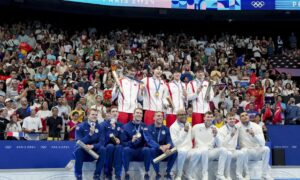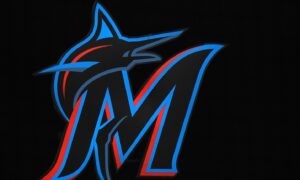Forty-one years ago, on February 22, 1980, the United States and the Soviet Union met in the Medal Round of the Winter Olympics. The United States hosted the 1980 Winter Olympics in Lake Placid, New York.
The Soviet Union was the four-time defending gold medalist heading into the matchup with the United States. However, on February 22, 1980, the Americans knocked off the best hockey team in the world by a score of 4-3.
The United States edging the Soviets is widely considered the greatest upset in sports history. For this reason, the matchup has been named “The Miracle on Ice.”
Difference in Talent
The United States’ 1980 hockey team, coached by Herb Brooks, consisted of mainly amateur players. The Soviets were loaded with professionals who had won multiple gold medals in the previous Olympic Games.
Vladislav Tretiak and Boris Mikhailov led the Soviets. Tretiak was regarded as the best goaltender in the world at the time, and Mikhailov was the Soviet Union’s right wing and captain. The team went 5-3-1 against NHL teams in exhibition games leading up to the winter games.
The United States’ hockey team heading into the 1980 Olympics was a new squad. Herb Brooks held tryouts in 1979, and his final squad of 20 men only featured one returner from the 1976 Olympic team.
Many people know from the movie “Miracle” that the American headliners were Jack O’Callahan, Jim Craig, and Mike Eurizone. These three athletes were teammates at Boston University. The Americans also had a bulk of talent from the University of Minnesota on their roster.
The 1980 United States’ team was the youngest group in American Olympic history with an average age of 21. These youngsters came together in an unexpected way to pull off one of the greatest upsets in sports history.
More than Just a Hockey Game
The Cold War, which coincided with the 1980 Winter Olympics, began in the late 1950s and lasted through 1991. It involved the global nuclear arms race and the fight over democracy versus communism.
The Cold War made the United States and the Soviet Union natural rivals when it came to the ice because of the philosophical differences between the two governmental regimes. President Jimmy Carter was considering a boycott of the 1980 Summer Olympics in Moscow because of the Soviet invasion of Afghanistan, so tension was peaking in 1980.
The Game
The United States and the Soviet Union went undefeated in pool play. The Americans upset Czechoslovakia, 7-3, who was picked to finish second behind the Soviets. Despite this, nobody gave the Americans any chance to beat the Soviets in the championship round.
The game was broadcast on ABC in front of 8,500 people in what is now “Herb Brooks Arena.” Brooks gave a passionate team to his speech before the game. This monologue was made famous in the movie “Miracle.”
“Great moments are born from great opportunity, and that’s what you have here tonight, boys. That’s what you’ve earned here tonight. One game; if we played them ten times, they might win nine. But not this game, not tonight.
Tonight, we skate with them. Tonight, we stay with them, and we shut them down because we can. Tonight, we are the greatest hockey team in the world. You were born to be hockey players, every one of you, and you were meant to be here tonight. This is your time.
Their time is done. It’s over. I’m sick and tired of hearing about what a great hockey team the Soviets have. Screw ’em. This is your time. Now go out there and take it!”
– Herb Brooks
When the game began, the Soviets took the early advantage over the Americans. Vladimir Krutov put the puck past Jim Craig at the 9:12 mark of the first period to go up 1-0. An arena packed with Americans suddenly became deflated, but the United States kept playing.
American, Buzz Schneider scored at 14:03 in the first to even the score, but the Soviets would take back the lead three minutes later. With a few minutes left in the first period, Sergei Makarov put his team back on top of the United States.
The Soviet’s lead did not last for long. American center Mark Johnson put the puck past Tretiak, the best goalie in the world, following a rebounded slap shot from Dave Christian. The first period ended in a tie.
At this point, the Americans believed that they could play with the Soviets, and the crowd felt the same way. When the Soviets came out of the locker room for the second period, Vladislav Tretiak was replaced by Vladimir Myshkin for allowing two goals.
orty-one years ago, on February 22, 1980, the United States and the Soviet Union met in the Medal Round of the Winter Olympics. The United States hosted the 1980 Winter Olympics in Lake Placid, New York.
The Soviet Union was the four-time defending gold medalist heading into the matchup with the United States. However, on February 22, 1980, the Americans knocked off the best hockey team in the world by a score of 4-3.
The United States edging the Soviets is widely considered the greatest upset in sports history. For this reason, the matchup has been named “The Miracle on Ice.”
Difference in Talent
The United States’ 1980 hockey team, coached by Herb Brooks, consisted of mainly amateur players. The Soviets were loaded with professionals who had won multiple gold medals in the previous Olympic Games.
Vladislav Tretiak and Boris Mikhailov led the Soviets. Tretiak was regarded as the best goaltender in the world at the time, and Mikhailov was the Soviet Union’s right wing and captain. The team went 5-3-1 against NHL teams in exhibition games leading up to the winter games.
The United States’ hockey team heading into the 1980 Olympics was a new squad. Herb Brooks held tryouts in 1979, and his final squad of 20 men only featured one returner from the 1976 Olympic team.
Many people know from the movie “Miracle” that the American headliners were Jack O’Callahan, Jim Craig, and Mike Eurizone. These three athletes were teammates at Boston University. The Americans also had a bulk of talent from the University of Minnesota on their roster.
The 1980 United States’ team was the youngest group in American Olympic history with an average age of 21. These youngsters came together in an unexpected way to pull off one of the greatest upsets in sports history.
More than Just a Hockey Game
The Cold War, which coincided with the 1980 Winter Olympics, began in the late 1950s and lasted through 1991. It involved the global nuclear arms race and the fight over democracy versus communism.
The Cold War made the United States and the Soviet Union natural rivals when it came to the ice because of the philosophical differences between the two governmental regimes. President Jimmy Carter was considering a boycott of the 1980 Summer Olympics in Moscow because of the Soviet invasion of Afghanistan, so tension was peaking in 1980.
The Game
The United States and the Soviet Union went undefeated in pool play. The Americans upset Czechoslovakia, 7-3, who was picked to finish second behind the Soviets. Despite this, nobody gave the Americans any chance to beat the Soviets in the championship round.
The game was broadcast on ABC in front of 8,500 people in what is now “Herb Brooks Arena.” Brooks gave a passionate team to his speech before the game. This monologue was made famous in the movie “Miracle.”
“Great moments are born from great opportunity, and that’s what you have here tonight, boys. That’s what you’ve earned here tonight. One game; if we played them ten times, they might win nine. But not this game, not tonight.
Tonight, we skate with them. Tonight, we stay with them, and we shut them down because we can. Tonight, we are the greatest hockey team in the world. You were born to be hockey players, every one of you, and you were meant to be here tonight. This is your time.
Their time is done. It’s over. I’m sick and tired of hearing about what a great hockey team the Soviets have. Screw ’em. This is your time. Now go out there and take it!”
– Herb Brooks
When the game began, the Soviets took the early advantage over the Americans. Vladimir Krutov put the puck past Jim Craig at the 9:12 mark of the first period to go up 1-0. An arena packed with Americans suddenly became deflated, but the United States kept playing.
American, Buzz Schneider scored at 14:03 in the first to even the score, but the Soviets would take back the lead three minutes later. With a few minutes left in the first period, Sergei Makarov put his team back on top of the United States.
The Soviet’s lead did not last for long. American center Mark Johnson put the puck past Tretiak, the best goalie in the world, following a rebounded slap shot from Dave Christian. The first period ended in a tie.
At this point, the Americans believed that they could play with the Soviets, and the crowd felt the same way. When the Soviets came out of the locker room for the second period, Vladislav Tretiak was replaced by Vladimir Myshkin for allowing two goals.
This move was shocking for the Americans, and it showed that the Soviets were fearful. This helped momentum swing to the side of the Americans. Soviet head coach Viktor Tikhonov later called this move the “biggest mistake of my career.”The Soviets ended the second with a one goal lead on the Americans. This score came on a power play goal by Aleksandr Maltsev two minutes into the period.
In the third period, Dave Johnson evened the score for the Americans at the 8:39 mark. The United States took the lead just over one minute later when captain, Mike Eurizone, fired a slap shot past Vladimir Myshkin.
For the first time in the game, the Americans led the Soviets by one goal. The United States stayed aggressive in the closing ten minutes to keep the Soviets on their heels.
Ken Morrow cleared the puck out of the offensive zone with twenty seconds left in the game as time ticked away. At this point, Al Michaels began his famous call of the Miracle on Ice that gives Americans goosebumps every time it’s played.
“11 seconds, you’ve got 10 seconds, the countdown going on right now! Morrow, up to Silk. Five seconds left in the game. Do you believe in miracles? YES!” – Al Michaels
The buzzer in the third period rang, and the “Miracle on Ice” became a reality. A group of college kids had defeated the best hockey team in the world.
The United States finished the job two days later against Finland to claim the Olympic Gold Medal. In 1999, Sports Illustrated declared that the “Miracle on Ice” was the greatest sports moment of the twentieth century.
I could not agree more with Sports Illustrated. I was not alive for the “Miracle on Ice,” but this was more than a hockey victory for the United States. It showed the country that democracy would prevail in a world filled with uncertainty.








